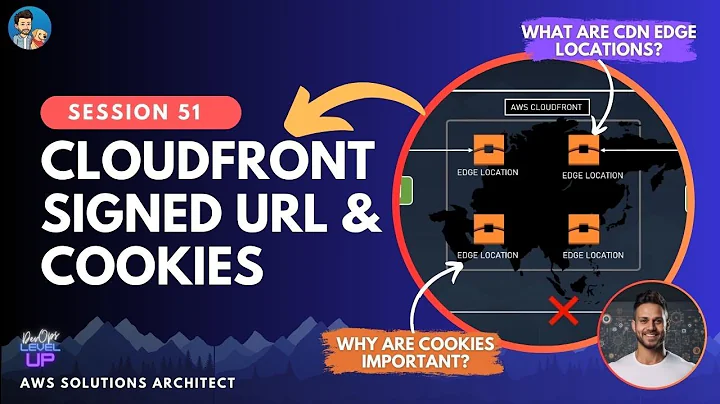What is difference between Pre-Signed Url and Signed Url?
Solution 1
First we gotta distinguish the services we are talking about and referring to here. Both S3 and CloudFront have URL signing features that work differently.
However, only S3 refers to them as Pre-signed URLs; CloudFront refers to them as Signed URLs and Signed Cookies.
Note the service names in the URLs, in the documentation below.
https://docs.aws.amazon.com/AmazonS3/latest/dev/PresignedUrlUploadObject.html
For a more in depth comparison of the different services check out the link below. If I had to guess, I would guess that AWS chose to name their signing services differently to avoid confusion.
Solution 2
From AWS docs
A pre-signed URL gives you access to the object identified in the URL, provided that the creator of the pre-signed URL has permissions to access that object. That is, if you receive a pre-signed URL to upload an object, you can upload the object only if the creator of the pre-signed URL has the necessary permissions to upload that object.
Again, from AWS docs
A signed URL includes additional information, for example, an expiration date and time, that gives you more control over access to your content. This additional information appears in a policy statement, which is based on either a canned policy or a custom policy. The differences between canned and custom policies are explained in the next two sections.
Solution 3
So far for my research:
A pre-signed URL(AWS doc): gives you access to the object identified in the URL, provided that the creator of the pre-signed URL has permissions to access that object. That is, if you receive a pre-signed URL to upload an object, you can upload the object only if the creator of the pre-signed URL has the necessary permissions to upload that object.
All objects and buckets by default are private. The pre-signed URLs are useful if you want your user/customer to be able to upload a specific object to your bucket, but you don't require them to have AWS security credentials or permissions. When you create a pre-signed URL, you must provide your security credentials and then specify a bucket name, an object key, an HTTP method (PUT for uploading objects), and an expiration date and time. The pre-signed URLs are valid only for the specified duration.
Signed Url (AWS doc): A signed URL includes additional information, for example, an expiration date and time, that gives you more control over access to your content. This additional information appears in a policy statement, which is based on either a canned policy or a custom policy. The differences between canned and custom policies are explained in the next two sections.
Conclusion based on my understanding:
Pre-signed Url used for creator, mean to upload new objects.
Signed Url all about accessing existing objects.
Related videos on Youtube
Akash Kava
Author of, YantraJS - JavaScript engine & runtime for .NET Standard GushCRM - CRM for Talent/Acting Agencies Blog: www.webatoms.in/blog Twitter: twitter.com/akashkava GitHub: github.com/neurospeech Company: neurospeech.com
Updated on July 14, 2021Comments
-
 Akash Kava almost 3 years
Akash Kava almost 3 yearsI intend to private object in public bucket, thus restricting access to object, not other objects in bucket. And I want to setup CloudFront to serve content with Signed URLs. Now in AWS S3 documentation, I see two different terms, one is Pre-signed URL to access private object, and other is Signed URL which requires downloading private key etc and do something more.
What is difference between Pre-Signed URL and Signed URLs? Can I use
PreSignedURL's with CloudFront?C#Library has methodGetPreSignedURL, does it automatically download private keys etc and does signing or thisGetPreSignedURLmethod is different then S3 URL Signing that requires setting up private keys and then signing URL? -
 Ramesh Rajendran over 10 yearsWhere you copy past from? can you share your URL for more details?
Ramesh Rajendran over 10 yearsWhere you copy past from? can you share your URL for more details? -
 Akash Kava over 10 yearsPre-Signed Url also has expiry date & time.
Akash Kava over 10 yearsPre-Signed Url also has expiry date & time. -
 Ted Taylor of Life over 7 years@AkashKava Is it possible to have a url without a expiration date or time?
Ted Taylor of Life over 7 years@AkashKava Is it possible to have a url without a expiration date or time? -
 NineCattoRules about 7 years@TedTaylorofLife no, the max. is 7 days
NineCattoRules about 7 years@TedTaylorofLife no, the max. is 7 days -
Harry almost 6 yearsActually, they are the same. S3 has pre-signed URL. There is a notion of “URL signing”, which is a process of creating pre-signed URL’s for S3 objects. However, when someone says “signed URL”, it’s just short hand for “pre-signed URL”. Also your second link doesn't says anything about Signed URL
-
Jack almost 3 yearsI think the dojo tutorials link has been changed. Looks to me like the new link is at: tutorialsdojo.com/…






